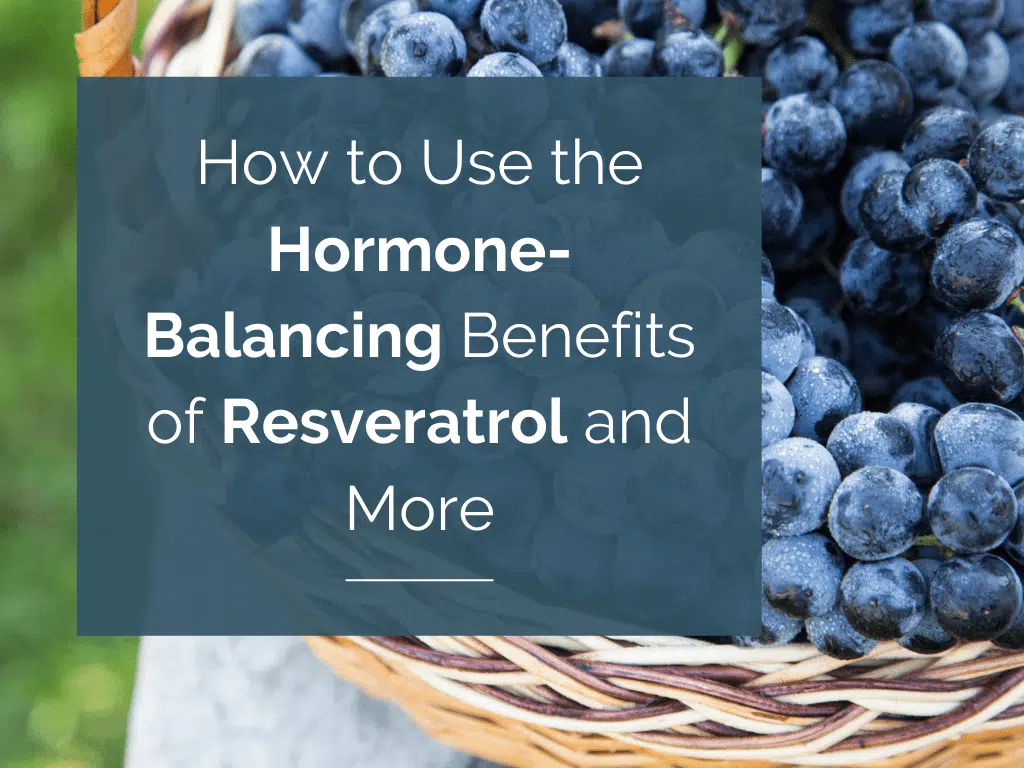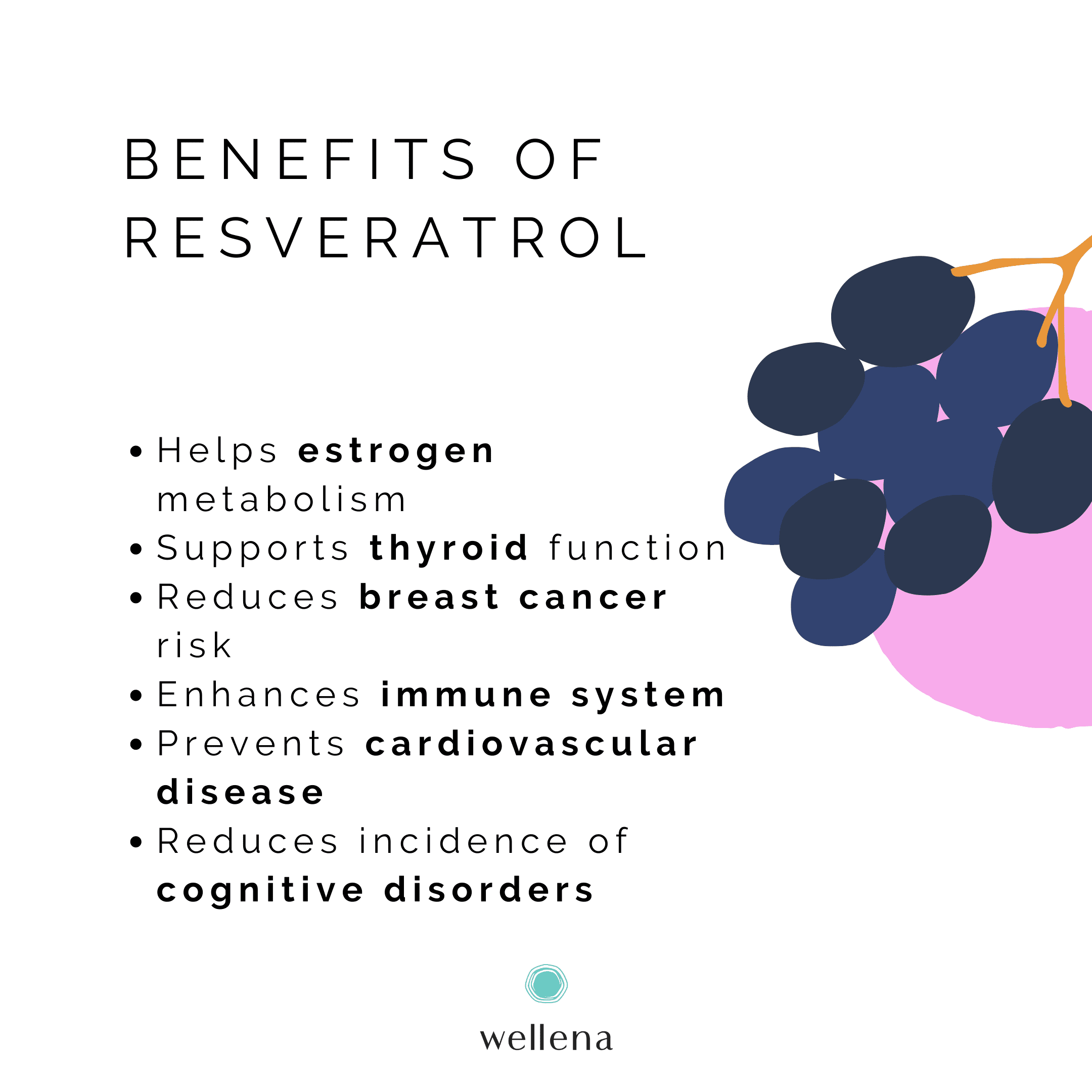
What You Will Learn in This Article
- What is Resveratrol?
- Importance of Resveratrol Now, During the Novel Virus
- How Resveratrol Helps Balance Hormones
- Other Benefits of Resveratrol
- What to Look for in a Resveratrol Supplement
- Resveratrol Supplement I Recommend
Resveratrol has long been known as the beneficial component of red wine. It’s especially famous for the role it plays in the so-called “French Paradox” – how the French seem to have low death rates from heart disease despite a diet that is rich in butter and cream (high saturated fat and “cholesterol”).
So, if you want to get healthy with resveratrol, is wine really the best way to take it in?
Just to put it into perspective, the average red wine contains around 0.36 to 1.97 milligrams of resveratrol per liter. That’s going to take a few bottles of wine (at least 75) to get to the 150 to 500 milligrams per day to see truly medicinal benefits.
What you gain from getting some amount of resveratrol will be offset by the impact of alcohol – an especially bad idea if you suffer from hormonal issues.
A healthier option: supplementation. However, knowing what type of supplement is best for you and what ingredients to avoid is key.
What is Resveratrol?
Resveratrol is a polyphenol that occurs not only in wine, but other botanicals such as mulberries, peanuts, and Japanese Knotweed. Japanese Knotweed (Polygonum cuspidatum) in the form of Itadori tea has been used for centuries in traditional Japanese and Chinese medicine as a tonic for heart disease and strokes. Red wine and Itadori tea/Japanese Knotweed are the best sources of resveratrol.
Importance of Resveratrol Now, During the Novel Virus
At a time when everyone is concerned about boosting the immune system and taking in additional antivirals, antioxidants, and anti-inflammatory substances, resveratrol steps up to the plate. This natural bioflavonoid just happens to be all three of those things. Don’t worry about running out of wine—in this case, it’s much better to take resveratrol as a supplement.
Antiviral
Resveratrol has been studied and been shown to be effective against a number of different viruses, including influenza, hepatitis C virus, respiratory syncytial virus, varicella zoster, Epstein-Barr herpes simplex virus, human immunodeficiency virus (HIV), African swine fever, enterovirus, human metapneumonia virus, and duck enteritis virus and in the virus used to induce multiple sclerosis in animal models.
In almost all of these studies, resveratrol showed high antiviral potential; the only exceptions were the animal model of multiple sclerosis and hepatitis C. In those two cases, resveratrol actually worsened the disease.
In a cell study of the novel virus, resveratrol not only fought the virus but provided protection to the cells from damage from the virus. It also helped prevent the virus from replicating. The researchers noted that due to the tendency of resveratrol to also increase oxidative stress at higher doses (which we don’t want), it’s important to take it at recommended doses and not exceed the upper limit.
Antioxidant
Resveratrol also serves as an antioxidant. In this capacity, it could donate its extra electrons to help lessen the lung damage from excessive free radicals. Resveratrol also increases other antioxidants in the body. In a study of human lung cancer cells, resveratrol was able to restore levels of the super antioxidant, glutathione.
Other antioxidant enzymes that resveratrol promotes include Superoxide dismutase (SOD), catalase, and thioredoxin. Some studies also suggest the resveratrol is able to lower free radicals and inflammation-associated genes, including iNOS, Myeloperoxidase, and NADPH oxidase.
Anti-inflammatory
Resveratrol is a known anti-inflammatory. In fact, in a cell study, both resveratrol and quercetin were shown to specifically fight inflammation in the cells that line the airway. This has positive implications for COPD, asthma, and other inflammatory lung diseases. The researchers concluded that resveratrol and quercetin may be beneficial in inflammatory diseases where steroid drugs are ineffective.
In an animal study of airway inflammation, resveratrol reduced pro-inflammatory cytokines. Another study using human airway cells concluded that “Resveratrol might be superior to corticosteroids in COPD therapy, because it more efficiently reduces the release of inflammatory mediators and has limited effects on VEGF in COPD.”
How Resveratrol Helps Balance Hormones
Resveratrol plays a role in estrogen metabolism. It has a similar structure to estradiol. It weakly binds to and alters estrogen receptor signalling. For that reason, resveratrol is considered to be a phytoestrogen.
According to Dr. Carrie Jones, resveratrol is helpful for estrogen metabolism because it increases your levels of quinone reductase (NQO1). In the liver’s phase 1 detoxification, a metabolite of estrone, 4-hydroxy-estrone may be sent down a pathway that converts it into a quinone. Quinones increase risk for DNA damage (raising cancer risk). Quinone reductase breaks down the quinones and sends the metabolite back to be methylated properly.
Since resveratrol is effective at increasing quinone reductase and protects DNA against oxidative damage, it has been used as a part of breast cancer therapy protocol.
Resveratrol may also help the thyroid—particularly from negative effects from fluoride. In a rat study conducted in 2014, fluoride was administered to the rats to cause thyroid damage. The rats that were given resveratrol were protected from toxicity and were able to return their thyroid hormones to normal range.
Other Benefits of Resveratrol
Resveratrol has also been studied for its effects on metabolic syndrome, cardiovascular disease (thanks to the French Paradox), cancer, and neurodegenerative disorders like Azheimer’s disease.
Cardiovascular Disease
When it comes to cardiovascular disease, Resveratrol appears to be more helpful for women than it is for men—possibly due to its effects on estrogen.
Cancers
When combined with melatonin (also an antioxidant), a couple of studies have indicated that resveratrol may be helpful for preventing breast cancer. It was concluded that, “the combination resulted in a significant decrease in tumor incidence.”
Brain and Cognitive Disorders
Melatonin also works with resveratrol to reduce oxidative stress in the brain. The combination has potential in reducing the incidence of Alzheimer’s Disease.
What to Look for in a Resveratrol Supplement
Standardized
Herbal supplements are standardized to ensure you’re getting a certain number of milligrams of the desired ingredient. It’s a form of quality control that ensures that no matter what type of extraction is used (water soluble, alcohol soluble, etc), the final product has a pre-specified standard percentage of a given constituent.
For example, let’s say you’re buying red wine capsules. A standardized product will ensure it has a certain percentage of red wine extract in each capsule. If you’re buying resveratrol specifically, the product may be standardized to contain only trans-resveratrol, rather than a combination of trans- and -cis, see below.
Trans Form
Resveratrol appears in two forms: trans and cis. According to research, the trans form is the form that appears to be more active in the body. To ensure you get the desired effects, make sure the supplement you find is in the “Trans” form.
Combined with Another Bioflavonoid
Certain other plant compounds have been shown to increase the bioavailability of resveratrol or to work synergistically with it. One of these compounds is quercetin. Quercetin is a flavonoid that can be found in foods like red grapes (and wine), apples, onions, and capers. It is a natural antihistamine. Quercetin often occurs alongside resveratrol, but in amounts 10 times that of resveratrol.
Studies indicate these two compounds may work together synergistically in some way. Quercetin inhibits sulfation of resveratrol, which may result in enhancing resveratrol’s bioavailability—making it better utilized by the body. Combining resveratrol with quercetin may be more effective than either one of them alone.
Resveratrol Supplement I Recommend
Wellena’s Resveratrol++ is a standardized Trans-Resveratrol that includes 200 mg of Resveratrol and 200 mg Quercetin. The resveratrol has been standardized to all trans resveratrol, and no cis resveratrol. As previously mentioned, trans-resveratrol has been shown to be the more effective form.
It’s dairy-free, gluten-free, soy-free, vegetarian, and non-GMO.
How to Take: As a dietary supplement, take one capsule per day, or as directed by your health care practitioner.
You can get Resveratrol++ here.
Resources
Weiskirchen, S. & Weiskirchen, R. Resveratrol: How Much Wine Do You Have to Drink to Stay Healthy? Advances in Nutrition. July 2016.
Abba, Y. et al. Antiviral Activity of Resveratrol against Human and Animal Viruses. Advances in Virology. November 29, 2015.
Lin, S.-C. et al. Effective inhibition of MERS-CoV infection by resveratrol. BMC Infectious Diseases. 2017.
Kode, A. et al. Resveratrol induces glutathione synthesis by activation of Nrf2 and protects against cigarette smoke-mediated oxidative stress in human lung epithelial cells. American Journal of Physiology. Lung cellular and molecular physiology. March 2008.
Rege, S. D. et al. Neuroprotective effects of resveratrol in Alzheimer disease pathology. Frontiers in Aging Neuroscience. 2014.
Donnelly, L. E. et al. Anti-inflammatory effects of resveratrol in lung epithelial cells: molecular mechanisms | American Journal of Physiology-Lung Cellular and Molecular Physiology. American Journal of Physiology. Lung cellular and molecular physiology. October 2004.
Wang, X.-L. et al. The Effects of Resveratrol on Inflammation and Oxidative Stress in a Rat Model of Chronic Obstructive Pulmonary Disease. Molecules. September 2017.
Knobloch, J. et al. Resveratrol Impairs the Release of Steroid-Resistant Inflammatory Cytokines from Human Airway Smooth Muscle Cells in Chronic Obstructive Pulmonary Disease. The Journal of Pharmacology and Experimental Therapeutics. December 2010.
Louis, X. L. Are the cardioprotective effects of the phytoestrogen resveratrol sex-dependent? Canadian Journal of Physiology and Pharmacology. 2019.
Jones, C. Estrogen Metabolism with Dr. Carrie Jones of Dutch Labs: Functional Medicine Discussion. YouTube. October 24, 2019.
Ko, J.-H. et al. The Role of Resveratrol in Cancer Therapy. International Journal of Molecular Sciences. December 2017.
Sarkar, C. & Pal, S. Ameliorative effect of resveratrol against fluoride-induced alteration of thyroid function in male wistar rats. Biological Trace Element Research. December 2014.
Singh, C. K. et al. Resveratrol-based combinatorial strategies for cancer management. The Annals of the New York Academy of Sciences. July 2013.
Kwon, K. J. et al. Melatonin synergistically increases resveratrol-induced heme oxygenase-1 expression through the inhibition of ubiquitin-dependent proteasome pathway: a possible role in neuroprotection. Journal of Pineal Research. March 2011.
Examine team. What is actually in my herbal supplement? Examine.com Accessed April 13, 2020.
Morris, V. L. et al. Anti-tumor Properties of cis-Resveratrol Methylated Analogues in Metastatic Mouse Melanoma Cells. Molecular and Cellular Biochemistry. April 2016.

This is really a great article. It is so chock full of information. Thank you!!
SO HOW DID U COME UP WITH THAT DOSAGE
Hi Pat, this is the dosage shown in studies to be the average therapeutic dosage. ~HB Support